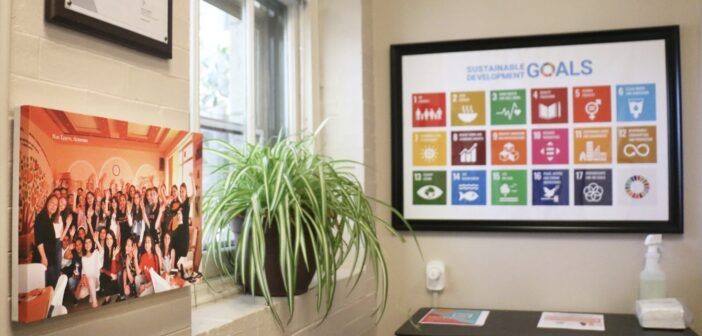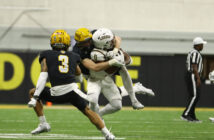When Claire Kirshenbaum, ‘24, was applying to colleges, Lehigh didn’t even appear on her radar of preferred colleges and universities.
“I was very anti-Lehigh,” Kirshenbaum said, giggling as she understood the irony of being interviewed on Lehigh’s campus.
Despite Kirshenbaum’s apathy, her mom happened upon a webinar highlighting the partnership Lehigh has with the United Nations.
When Kirshenbaum joined the Zoom, her interest was piqued. Soon after, she was drafting passionate supplemental essays for Lehigh, noting its Lehigh University/United Nations Partnership — only six universities in the world could come close to offering her a program like this.
Lehigh’s admissions officers agreed she belonged at the university that could provide this experience.
Now in her senior year, Kirshenbaum has been acting as the Lehigh University Youth Representative to the U.N. since her sophomore year.
The Office of International Affairs houses the Office of Fellowship Advising and U.N. Programs. This is where the U.N. Youth Representative Program is housed.
Kirshenbaum thinks the program provides students with a sense of “endless possibility” as they continue to figure out how they can raise their voices in an ever-globalizing community.
“I think it’s extremely important to bring more youth to the U.N. and get their ideas going and also get that exposure,” Kirshenbaum said.
Through this agreement that allows Lehigh to work with 10 nongovernmental organizations across the world, Lehigh students can present at U.N. conferences, submit written U.N. statements, conduct global research, and organize events with diplomats and other high-profile global leaders.
Elena Reiss, assistant director of the Office of Fellowship Advising and U.N. Programs, is tasked with managing the U.N. Youth Representative Program. She said this rare access to the U.N. allows students to take on roles not offered to most of their peers.
“We met with the Russian Ambassador two weeks before the (Russo-Ukrainian) war started,” Reiss said. “You don’t get that experience anywhere else. You don’t get to talk to the person who represents the voice of the country that is going to war anywhere else through any other programs.”
Reiss cited multiple instances of students getting involved: two former youth representatives worked on a project that would develop a virtual training course on non-communicable diseases in communities lacking necessary resources. Another representative worked with an NGO in Nigeria focusing on women’s health issues by conducting screenings for breast and cervical cancers and educating about the HPV vaccine.
“They are bringing awareness toward those issues to the global stakeholders, so (the awareness) is not just something that happens at Lehigh,” Reiss said.
She said the initiative and courage students build from working with the U.N. through this program is extremely rewarding, as she consistently pushes students outside their comfort zones with the expectation that they will do things they “never thought they would be able to do before.”
U.N. global communications officer Felipe Queipo finds value in these students at the U.N. because they act as liaisons between distant communities and the headquarters in New York City.
“Students may become representatives of civil society organizations globally that do not have the means to have representation in New York,” Queipo said. “And the United Nations gets representatives in civil society with whom we can engage.”
Though this involvement could come from experts who have spent decades studying and working, Reiss has noticed a trend at the U.N. — she said they are looking for more youth voices.
She believes older generations form inhibitory habits and routines when it comes to their work, but youth have more space to clear their minds, focus on high-priority issues and act with revolutionary results.
Reiss said young people are more passionate about the future.
“Whether we’re talking about climate change, eradicating poverty, gender equality, quality of education or any of the other 17 Sustainable Development Goals, it’s up to youth to figure out how to get there by the year 2030, as identified by the U.N.,” Reiss said.
While older generations may provide resources, Reiss thinks many theories and actions should be coming from people like Kirshenbaum.
“I feel like a lot of our institutions are run by more older people that have already gotten all this experience,” Kirshenbaum said. “But I feel like we really need to create a shift and really empower more youth … let them know they can have an impact and their words do matter.”






Comment policy
Comments posted to The Brown and White website are reviewed by a moderator before being approved. Incendiary speech or harassing language, including comments targeted at individuals, may be deemed unacceptable and not published. Spam and other soliciting will also be declined.
The Brown and White also reserves the right to not publish entirely anonymous comments.